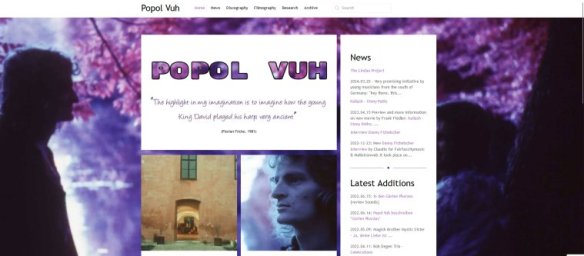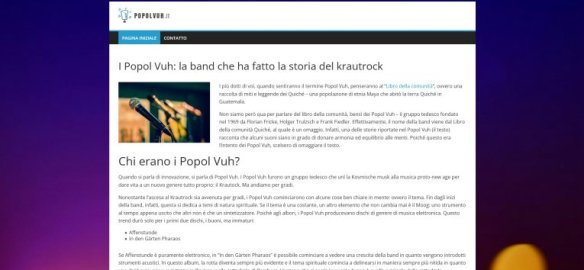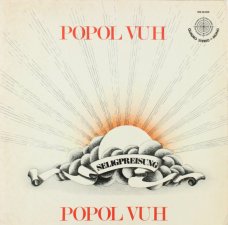 Popol Vuh were a German musical collective founded by keyboardist Florian Fricke in 1969 together with Frank Fiedler (sound design, fine cut), Holger Trülzsch (percussion), and Bettina Fricke (tablas and production). Other important members during the next two decades included Djong Yun, Renate Knaup, Conny Veit, Daniel Fichelscher, Klaus Wiese, and Robert Eliscu. The band took its name from the Mayan manuscript containing the mythology of highland Guatemala’s K’iche’ people.
Popol Vuh were a German musical collective founded by keyboardist Florian Fricke in 1969 together with Frank Fiedler (sound design, fine cut), Holger Trülzsch (percussion), and Bettina Fricke (tablas and production). Other important members during the next two decades included Djong Yun, Renate Knaup, Conny Veit, Daniel Fichelscher, Klaus Wiese, and Robert Eliscu. The band took its name from the Mayan manuscript containing the mythology of highland Guatemala’s K’iche’ people.
Popol Vuh began as an electronic music project, but under Fricke’s leadership they soon abandoned synthesizers for organic instrumentation and world music influences. They developed a productive working partnership with director Werner Herzog, contributing scores to films such as Aguirre, The Wrath of God (1972), Nosferatu the Vampyre (1979), and Fitzcarraldo (1982). The group are associated with West Germany’s 1970s krautrock movement and are considered progenitors of new-age and ambient music. Today, Popol Vuh’s best-reviewed works are In den Gärten Pharaos (1971) and Hosianna Mantra (1972).
 The band’s name, taken from the Mayan manuscript, has been translated roughly as “meeting place” or “book of the community”. Their first album, Affenstunde, released in 1970, can be regarded as one of the earliest space music works, featuring the then new sounds of the Moog synthesizer together with ethnic percussion. This continued for only one more album, In den Gärten Pharaos, and material later to be released on the soundtrack to Aguirre, the Wrath of God, before Fricke largely abandoned electronic instruments in favour of piano-led compositions from 1972’s Hosianna Mantra forward. This album also marked the start of exploring overtly religious themes rather than a more generally spiritual feeling within the music. The group evolved to include a range of instruments: wind and strings, electric and acoustic alike, combined to convey a mystical aura that made their music spiritual and introspective.
The band’s name, taken from the Mayan manuscript, has been translated roughly as “meeting place” or “book of the community”. Their first album, Affenstunde, released in 1970, can be regarded as one of the earliest space music works, featuring the then new sounds of the Moog synthesizer together with ethnic percussion. This continued for only one more album, In den Gärten Pharaos, and material later to be released on the soundtrack to Aguirre, the Wrath of God, before Fricke largely abandoned electronic instruments in favour of piano-led compositions from 1972’s Hosianna Mantra forward. This album also marked the start of exploring overtly religious themes rather than a more generally spiritual feeling within the music. The group evolved to include a range of instruments: wind and strings, electric and acoustic alike, combined to convey a mystical aura that made their music spiritual and introspective.

Popol Vuh influenced many other European bands with their uniquely soft but elaborate instrumentation, which took inspiration from the music of Tibet, Africa, and pre-Columbian America. With music sometimes described as “ethereal”, they created soundscapes through psychedelic walls of sound, and are regarded as precursors of contemporary world music, as well as of new age and ambient.
The band contributed soundtracks to films of Werner Herzog, including the aforementioned Aguirre, the Wrath of God, as well as Nosferatu, Fitzcarraldo, Cobra Verde, Heart of Glass and The Enigma of Kaspar Hauser, in which Fricke appeared.
Florian Fricke died in Munich on 29 December 2001 and the group disbanded.

And here´s their 4th album:
Popol Vuh was actually an old Mayan set of texts surrounding Mesoamerican mythologies and stories much like the Nordic myths that I was brought up with. Personally I feel this ads a great deal of mysticism and originality to a band that really doesn´t sound as anyone else.
Florian Fricke is the main engine behind this band setting the tone and different temperaments with his soft and gentle piano chords- much like a great conductor in front of a vast orchestra. His playing works like a great rhythm guitarist lurking in the background like a comfortable shadow always following you whether you´re running or smoking a cigarette on the corner.
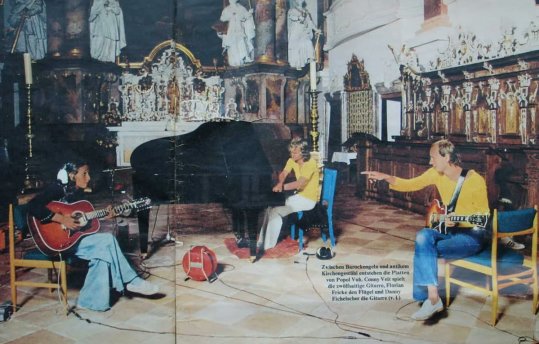
If I was asked to sum up the music of this record in one word, it would be beautiful – however daft and corny that may sound, but this is truly mesmerising in all of it´s splendour. This is achieved largely by democratic ways with all the musicians involved playing TOGETHER as a whole, rather than a great bulk of solos trying to compete with each other. Fluid like a stream, never turning quite simplistic much due to the different layers of instruments, which swirl vividly around like a red dress on Angelina Jolie. I will admit that there is one musician that stands out from the group, and that is Conny Veit who has got to be one of my favourite guitarists. He plays so effortlessly that at times you could swear you were listening to a rainy cloud caressing the strings with a drop or two. Gently gently without ever reducing himself to a fluffy teddy bear imitating Gilmour with a mouth full of churned butter. If you know this guy from Gila (another great kraut band gazillion of light years away from this outing), you might be in for a surprise, as he seems to have dropped his Jimi Hendrix crush for a more mellow and dreamy sound.
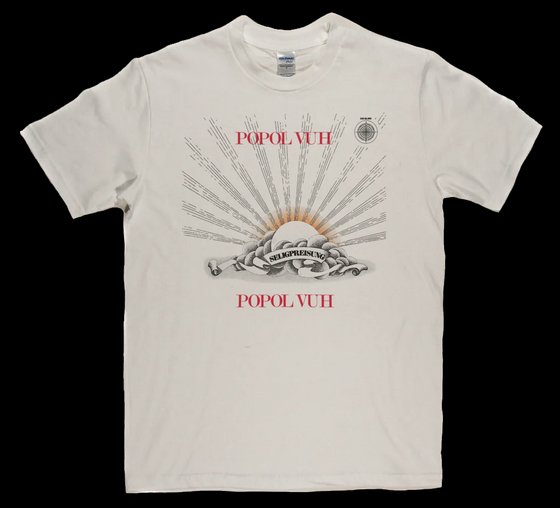
I have always had a certain amount of preservations concerning music, that evolves around religion, which is why I don´t care much for Neal Morse. Seligpreisung is indeed a religious album with its Hallelujas and rather celestial aura, but that doesn´t change the fact that is done with such impeccable craftsmanship and imagination, that you could paste it on to anything remotely resembling spirituality, -meaning whether you are a Christian, Buddhist, Jew, Hindu or you indulge yourself in the darker parts of the woods and call yourself a devil worshipper – you´d be hard pressed to NOT feel some sort of soulful attachment.
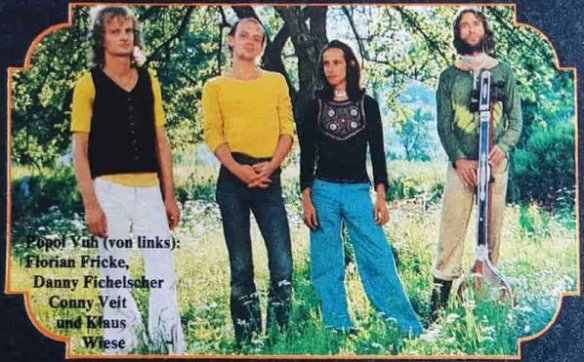
Seligpreisung is a record that makes you smile. It oozes out of the speakers like giant swooping waves of soothing music, that almost licks your wounds and scars as only your old Labrador from yesteryear could. So beautiful you wanna tear your teeth out. (Guldbamsen)
Oh, where have I put my incense sticks?
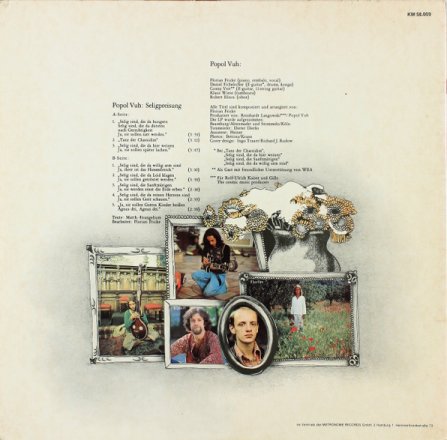
Personnel:
Robert Eliscu (oboe)
Daniel Fichelscher (guitar, drums, percussion)
Florian Fricke (piano, harpsichord, vocals)
Conny Veit (guitar)
Klaus Wiese (tambura)
+
Fritz Sonnleitner (violin on 07.)
Djong Yun (vocals on 07.)
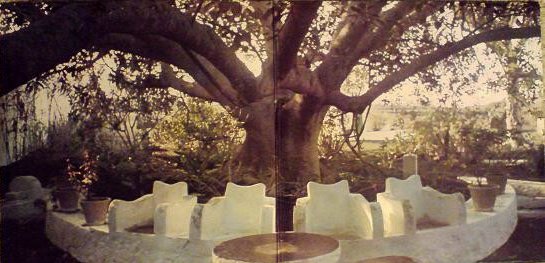
Tracklist:
01. Selig sind, die da hungern. selig sind, die da dürsten nach Gerechtigkeit. Ja, sie sollen satt werden 6.00
02. Tanz der Chassidim 2.54
03. Selig sind, die da hier weinen. Ja, sie sollen später lachen 5.08
04. Selig sind, die da willig arm sind. Ja, hier ist das Himmelreich 3.12
05. Selig sind, dieda Leid klagen. Ja, sie sollen getröstet werden + Selig sind, die Sanftmütigen. Ja, sie werden einst die Erde erben 6.13
06. Selig sind, die da reinen Herzens sind. Ja, sie sollen Gott schauen 5.15
07. Ja, sie sollen Gottes Kinder Heißen. Agnus Dei, Agnus Dei 4.59
Music: Florian Fricke
Lyrics: Florian Fricke & Saint Matthew (1)

(1) Saint Matthew, or Matthew the Evangelist, was, according to Church Fathers, one of the twelve Apostles of Jesus and one of the four Evangelists.
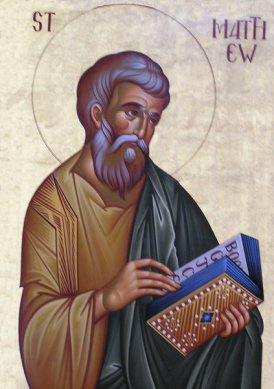
He wrote the Beatitudes, which was the textual basis for this album.

In October 2003 Klaus Schulze wrote:
“Florian was and remains an important forerunner of contemporary ethnic and religious music. He chose electronic music and his big Moog to free himself from the restraints of traditional music, but soon discovered that he didn’t get a lot out of it and opted for the acoustic path instead. Here, he went on to create a new world, which Werner Herzog loves so much, transforming the thought patterns of electronic music into the language of acoustic ethno music. (wkipedia)
More from Popol Vuh in this blog:
 Two unofficial websites:
Two unofficial websites:
